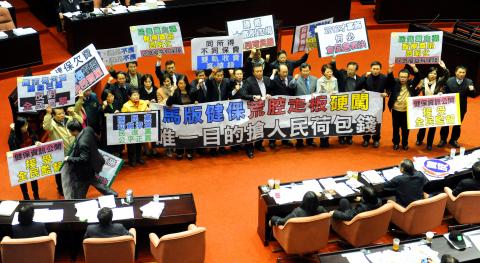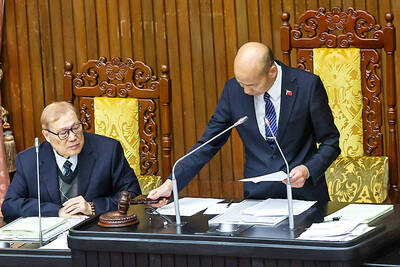The pan-blue-dominated legislature yesterday managed to push through a controversial amendment to the National Health Insurance Act (全民健康保險法) after Democratic Progressive Party (DPP) legislators walked out in protest over what they called a “failure.”
Department of Health (DOH) Minister Yaung Chih-liang (楊志良), who previously said he would resign if the legislature failed to pass the reform bill by the current legislative session, last night tendered his resignation to Premier Wu Den-yih (吳敦義) nonetheless.
Describing the amended National Health Insurance Act passed yesterday as 75 percent on a scale of zero to 100, Yaung in his resignation expressed regrets that he was unable to obtain the ideal 100 percent.

PHOTO: CHANG CHIA-MING, TAIPEI TIMES
Yaung was also apologetic, -saying his “personal incompetence had resulted in the bumpy road to reforming the national health insurance system.”
Wu had not approved Yaung’s resignation as of press time and was quoted by the Government Information Office in a statement as saying that he hoped Yaung would stay in his post and see through the implementation of the amended National Health Insurance (NHI) system.
Earlier yesterday, a version proposed by the DPP, which would have calculated an individual’s insurance fee based on household income, was voted down during the plenary session, prompting DPP caucus whip Ker Chien-ming (柯建銘) to call for the walkout.
Instead, the approved version, proposed by the Chinese Nationalist Party (KMT), will calculate a person’s premium based on his or her salary, as under the current system.
However, individuals who make extra income from investments, rent or bonuses that are four times their monthly salary would have to pay a “supplementary premium.”
Initial estimates by the government show the “supplementary premium” would increase NHI revenue by NT$20.8 billion (US$713.9 million) annually.
The amendment also tightens regulations on the eligibility of foreign residents for the insurance plan, stipulating that only holders of residency documents who are employed or have stayed in Taiwan for a minimum of six months can receive coverage.
The act originally covered foreign residents who had lived in Taiwan for a period of more than four months and full-time foreign workers employed by schools.
The Executive Yuan has the authority to decide when the new measures will come into force, the amendment said.
Before walking out, DPP legislators had taken turns speaking against the amendment, calling the KMT “inconsistent.” They accused President Ma Ying-jeou (馬英九) of breaking his promise to reform the NHI, saying the amendment was a “setback” rather than “reform.”
Holding up banners, the DPP caucus called the NHI reform process a “failure” and “ridiculous” and called on Wu to step down over the matter.
DPP Legislator Huang Jen-shu (黃仁杼) said the KMT only had electoral considerations in mind in proposing and passing the amendment, while Ker said that getting the right mechanism to calculate premiums was “essential.”
The sole purpose of the new reform package, one large banner read, was to enable the government to “reach [deeper] into the people’s pockets.”
“The KMT flip-flopped in a major way on this policy. Common sense dictates that either Wu should step down or Ma should apologize,” Ker said. “[The government] completely lacks the ability to carry out political policy.”
Ker said that after lawmakers rejected the first proposal, the government should have taken it back to make major revisions before re-submitting it to the legislature.
Instead, he said, what government agencies did was make “a few small tweaks” before returning it for a vote.
“The DPP had no choice but to reject this,” he said after approval of the article-by-article vote in which KMT lawmakers agreed to revise Article 10, which deals with the eligibility of those enrolled in the system that is compulsory for most Taiwanese.
After the DPP walkout, DPP Legislator Huang Sue-ying (黃淑英) stayed behind and demanded a vote and re-vote on every article of the KMT’s version. The marathon vote and re-vote on all 106 articles began at 10am and did not pass the third reading until about 8pm.
Yaung told a press conference afterward that the premium rate was expected to be lowered from 5.17 percent to 4.91 percent.
Yaung said about 83 percent of residents would see a lower insurance fee, while insurance fees for between 16 and 17 percent of the population would remain unchanged.
KMT legislators said their version was “the most feasible for the time being.”
KMT Legislator Lai Shyh-bao (賴士葆) said the amendment was expected to lower insurance fees for the economically disadvantaged.
Yesterday’s denouement brought to an end long, torturous efforts to salvage the debt-ridden NHI system.
The DOH late last year had proposed to reform the current NHI premium scheme by using an individual’s household income as a calculation mechanism.
However, that proposal failed to clear the legislative floor on Dec. 7, even though a majority of lawmakers agreed with the mechanism.
Some lawmakers had concerns over the proposal, saying it would set premiums for housewives and the unemployed by assuming a “virtual” monthly income of NT$17,280, a scheme they said did not reflect reality and could hurt the economically disadvantaged.
Some KMT legislators had feared the version could cost the party the next legislative election.
The DOH and the KMT caucus went back to the drawing board and eventually proposed a revised version, abandoning the household income plan and retaining the current premium calculation mechanism and including extra income in the calculation.
ADDITIONAL REPORTING BY SHIH HSIU-CHUAN

DEFENDING DEMOCRACY: Taiwan shares the same values as those that fought in WWII, and nations must unite to halt the expansion of a new authoritarian bloc, Lai said The government yesterday held a commemoration ceremony for Victory in Europe (V-E) Day, joining the rest of the world for the first time to mark the anniversary of the end of World War II in Europe. Taiwan honoring V-E Day signifies “our growing connections with the international community,” President William Lai (賴清德) said at a reception in Taipei on the 80th anniversary of V-E Day. One of the major lessons of World War II is that “authoritarianism and aggression lead only to slaughter, tragedy and greater inequality,” Lai said. Even more importantly, the war also taught people that “those who cherish peace cannot

STEADFAST FRIEND: The bills encourage increased Taiwan-US engagement and address China’s distortion of UN Resolution 2758 to isolate Taiwan internationally The Presidential Office yesterday thanked the US House of Representatives for unanimously passing two Taiwan-related bills highlighting its solid support for Taiwan’s democracy and global participation, and for deepening bilateral relations. One of the bills, the Taiwan Assurance Implementation Act, requires the US Department of State to periodically review its guidelines for engagement with Taiwan, and report to the US Congress on the guidelines and plans to lift self-imposed limitations on US-Taiwan engagement. The other bill is the Taiwan International Solidarity Act, which clarifies that UN Resolution 2758 does not address the issue of the representation of Taiwan or its people in

The Philippines yesterday criticized a “high-risk” maneuver by a Chinese vessel near the disputed Scarborough Shoal (Huangyan Island, 黃岩島) in a rare incident involving warships from the two navies. The Scarborough Shoal — a triangular chain of reefs and rocks in the contested South China Sea — has been a flash point between the countries since China seized it from the Philippines in 2012. Taiwan also claims the shoal. Monday’s encounter took place approximately 11.8 nautical miles (22km) southeast” of the Scarborough Shoal, the Philippine military said, during ongoing US-Philippine military exercises that Beijing has criticized as destabilizing. “The Chinese frigate BN 554 was

LEISURE: The new law adds Confucius’ birthday, the anniversary of the Battle of Guningtou, Constitution Day and Little New Year as national holidays The Legislative Yuan yesterday passed new legislation adding four national holidays and making Workers’ Day a national holiday for all sectors. The Chinese Nationalist Party (KMT) and the Taiwan People’s Party used their combined majority in the legislature to push the jointly proposed draft through its third and final reading. This new law supersedes the existing regulations for the implementation of memorial days and state holidays, which are administered by the Ministry of the Interior. The new law recognizes Confucius’ birthday on Sept. 28, the anniversary of the Battle of Guningtou on Oct. 25, Constitution Day on Dec. 25 and “Little New Year,”